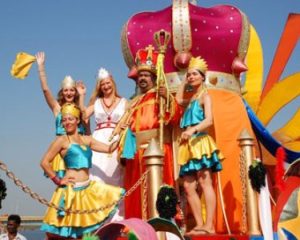It is carnival time in Goa, with today, Shrove Tuesday being the last day of the celebrations, Wednesday marking the start of Lent.
In Panjim (Panaji) , the festivities began on Sunday, (Feb. 10) with 48 floats, led by the triumphant entry of King Momo, or Momus, the Greek god of satire and laughter, and his entourage of dancing damsels atop a gaily decorated truck. It was witnessed by some 15,000 people, mostly tourists, in the state capital Panaji.
Similar parades were being held in major towns until Feb. 13 ahead of Ash Wednesday when Catholics begin a 40-day Lent period of prayer and abstentions leading to Easter that commemorates the Passion and resurrection of Christ
The government led by the right wing Bharatiya Janata Party (BJP) provided administrative support and sponsored the extravagant three-day carnival parades in major towns. It may be noted that hard-line Hindu supremacist groups (often with the tacit support of the powers that be) strongly oppose what they perceive as ‘Western culture’ as anti-Indian. Despite hard-line Hindu groups’ opposition, Goa’s government has gone all out to celebrate the former Portuguese colony’s annual carnival.
The parade floats highlighted issues such as the environment, wildlife and pollution substance abuse. Even state police put up a float focusing on the adverse impact of smoking and alcohol consumption.
The carnival tradition, which ‘allows’ people to indulge in carnal pleasures ahead of the period of abstention, was introduced to Goa by the Portuguese who made it their colony for 451 years until 1961.
Local Catholics say life in the state has blended with Portuguese language and culture to create a distinct Goan culture that includes the carnival tradition.
The BJP cannot afford to discard Goan culture in its push for its own brand of Hindu hegemony because of “fear that any move in that direction may alienate their Goan vote bank,” he said.
Some observers feel that the sensitivity toward Goan culture may continue for few more years until uncontrolled migration of outsiders to the state changes its demography completely.
About 25 percent of Goa’s 1.4 million people are Christians, almost all of them Catholics.
But all local people are attuned to Goan culture and cuisine, which includes non-vegetarian food such as beef, a food that has become the focal point of political tension elsewhere in India.
“Irrespective of the government in New Delhi, the carnival, beef eating and social habits will not change,” locals say.
Some locals say that the way the BJP adapts itself in Goa shows that they “are hypocrites and power hungry.”
Former parliamentarian John Fernandes said the BJP government in Goa has seven elected Catholics among its 13 legislators in the 40-seat-house. The BJP runs a coalition with the clear support of Catholics, so it cannot offend Catholic voters.
The Catholic Church hierarchy distanced itself from carnival celebrations some decades ago after declaring it “not a Christian festival”. Church Officials have even prohibited the use of church premises to read out King Momo’s edict to “disobey parents, have fun and be merry” during the three days.


